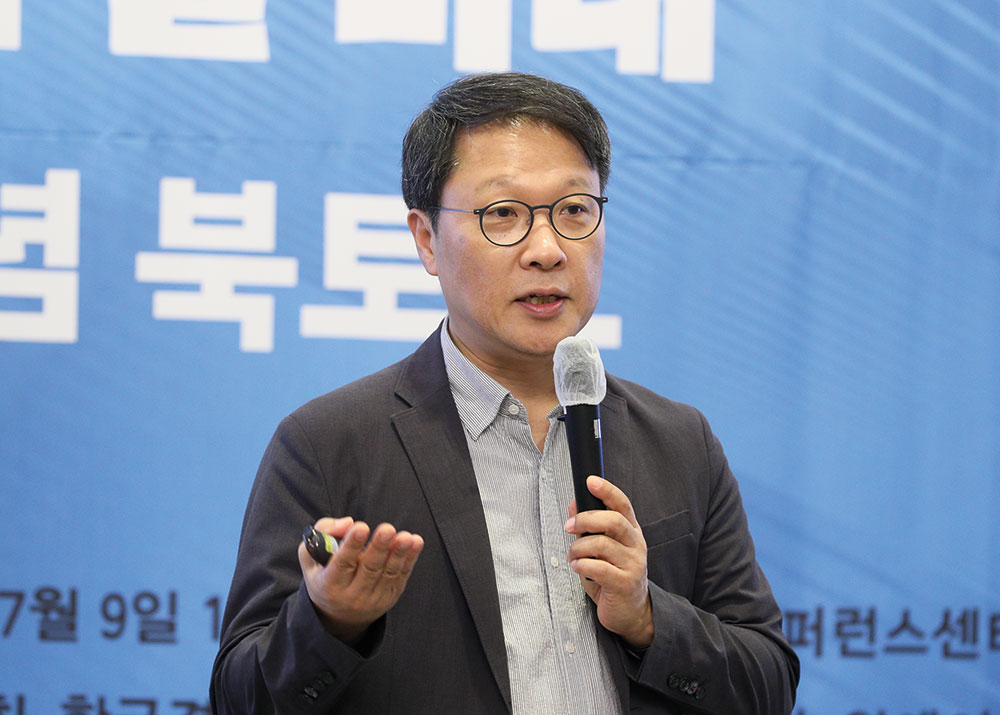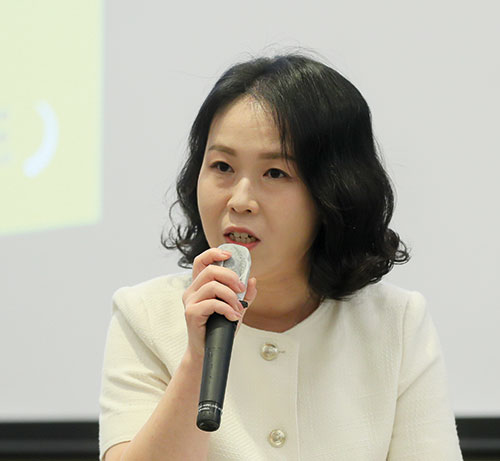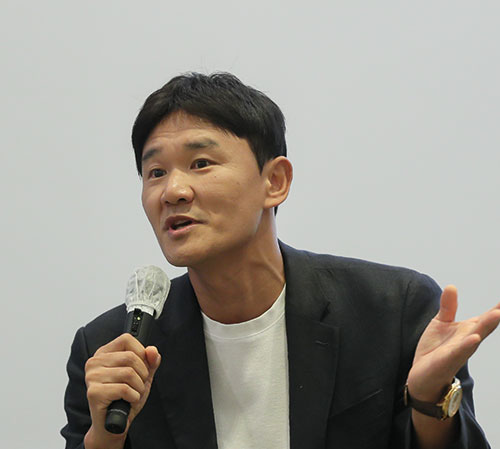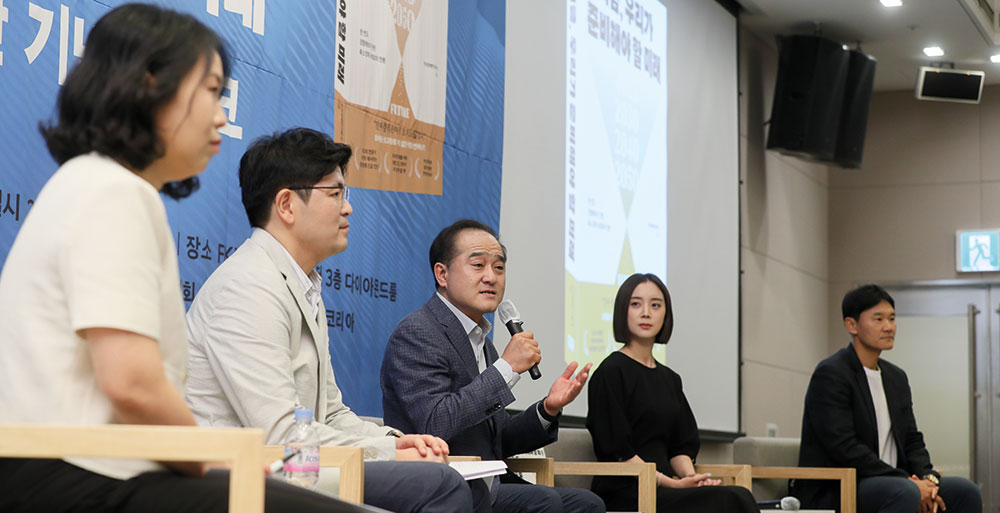in Focus
Facing the Reality of a Shrinking
Population and Economy
The Future We Must Prepare For Now
As of 2024, Korea’s total fertility rate has fallen to 0.75, while the population aged 65 and older has exceeded 10 million. With low birth rates and rapid aging threatening the future of the Korean economy, the Korea Economic Research Institute (KERI), together with 13 expert contributors, published The Future We Must Prepare For Now (RH Korea, 2025) on July 9. A book talk held on the day of publication brought together the co-authors, including KERI researchers and external experts, as well as special panelists. The event facilitated broad discussions on demographic crises, labor market shifts in an era of economic contraction, and pressing issues such as marriage, childbirth, and employment.
Compiled by Hye-won Kim
Photographer Dong-yeol Kim
Chul-hee Lee Professor, Department of Economics, Seoul National University

“To proactively address the realities of demographic transformation, Korea must become a society where no one is wasted.”
Structural Shocks from Rapid Population Decline
According to recent long-term projections by KOSTAT, the national population is expected to decline to two-thirds of its current level within 50 years. In the worst-case scenario, the population could drop to as low as 30 million. The primary concern is not the decrease itself, but the speed at which Korea’s demographic structure will shift within a relatively short time. While a lower population density may reduce congestion and some environmental gains, the costs and disruptions involved in adapting to such rapid changes across all sectors of society will be substantial. In this context, the true challenge for Korea lies less in the size of reduction, and more in the pace of reduction.
Social Fractures from Structural Imbalances
A pressing concern is the uneven nature of the demographic decline. Birth rates have plummeted among younger generations, creating sharp imbalances. In the 1970s, the number of births per year exceeded one million. Today, it has dropped below 250,000. This drastic decline is straining core social infrastructure, such as hospitals, schools, and the military. Already, many regions are witnessing the closure of obstetrics clinics and a growing number of schools have empty classrooms due to low enrollment.
Four types of imbalances in the labor market are expected to intensify. First is the quantitative imbalance caused by the overall reduction in the working population. Second is the sectoral imbalance, where demand is rising sharply, while the available workforce is simultaneously shrinking, such as social welfare services. Third is generational imbalance from the decline in the youth population, which weakens intergenerational representation and reduces the dynamism of the labor market. Fourth is the regional imbalance between the capital area and other regions, as economic population disparities grow. These are not just statistical trends; they represent structural crises with everyday consequences.
Proactive Response to Demographic Change
What are the solutions? First, the most effective use of the shrinking population must be made. This means increasing labor force participation across all demographics, improving productivity, and reforming the education system to cultivate talent in line with labor market needs. In parallel, strong policy interventions that address low fertility need to mitigate the pace of population decline.
Above all, a shift in social awareness is necessary. First, society must place greater value on individuals regardless of age, gender, or background. Second, the economy must be restructured to match the needs of individuals by designing jobs that align with diverse personal circumstances. Third, we must ensure that people have opportunities to realize their full potential. Finally, social safety nets must be reinforced to protect individuals throughout this transition. To proactively address the realities of demographic transformation, Korea must become a society where no one is wasted.

Chul Chung
- Chief Research Officer, FKI;
President, KERI

Jae-pil Han
- Professor, Department of Economics, Chungnam National University

Min-hee You
- Research Fellow, KERI

Hye-rim Woo
- Broadcaster
(former member of Wonder Girls)

Dong-sik Jeong
- Football Referee, K-League
The Reality of Population Decline
Moderator Is Korea’s population decline truly that serious? What kind of future must we begin preparing for today?
Chul Chung To maintain our current population, the fertility rate must be around 2.1. In reality, it remains in the 0.7 range. The challenge lies not only in the population decline itself, but also in its simultaneous overlap with aging demographics and a shrinking youth population. In times like this, it is essential to approach the issue with a clear-eyed analysis and creative solutions.
The Realities of Childrearing
Moderator Let us hear about the realities of balancing work and parenting. Hye-rim, you were a member of Wonder Girls and are now a mother of two. What does your daily life look like today?
Hye-rim Woo Since experiencing childbirth and parenting, I have often reflected on the idea of balance. Naturally, when a child is born, your entire schedule revolves around them. As I continued working in broadcasting, I reached a point where I had to find a way to balance work and my personal life. With the birth of my second child, I am once again trying to strike that balance. I am grateful that I am not doing this alone. My whole family is involved in raising the children, and that is the reason I am able to balance parenting and work. It is certainly challenging, but I have found that these two areas can create positive synergy. Raising children gives me a tremendous source of strength.
Moderator How about you, Dong-sik, as a father of three sons?
Dong-sik Jeong Honestly, raising three children is extremely difficult. There is a saying that “it takes a village to raise a child,” and that really resonates with me. It underscores how important government support is. As a beneficiary of multi-child support programs, I must admit that the benefits are not very tangible. Although there is a parental leave system in place, many do not take advantage of it because it does not come with financial guarantees. Given how serious the low birth rate crisis has become in Korea, I believe we need bold and transformative government policies.
Perceptions of Marriage and Childbirth
Moderator I understand the Korea Economic Research Institute conducted a survey earlier this year on marriage and childbirth. What were the results?
Min-hee You Unmarried respondents tended to view marriage and childbirth negatively, whereas married individuals generally assessed them positively. It seems that in our society, marriage is still widely regarded as a prerequisite for childbirth. For women in particular, the decision to marry and have children involves complex considerations. Although women’s educational attainment and capabilities have increased, many still face career interruptions due to marriage or childbirth. This is not merely a personal issue, but a national loss of talent and productivity. Therefore, we must build a stronger foundation to support women. Unless we eliminate the so-called “marriage penalty,” where women suffer disadvantages due to marriage and childbirth, policies aimed at encouraging childbirth will remain ineffective.
Young People’s Perceptions of Careers
Moderator Are students’ perceptions of jobs and careers also shifting due to changes in population structure?
Jae-pil Han In some cases, the lack of practical information prevents young people from viewing jobs from a career development perspective. While the desire for job security persists, the concept of a “job for life” is gradually fading. More students are starting to recognize that continuity of work experience, rather than long-term employment, is what truly matters. I believe universities must go beyond delivering knowledge and begin offering guidance on how to live life meaningfully. The same holds true for companies. We must move away from academic pedigree-based hiring and establish systems that assess true capability.
Adapting to a Shrinking Economy
Moderator The younger generation is often referred to as the “N-Po Generation,” having given up on numerous life milestones. Now, they face the added challenge of a shrinking economy. What tools do they need to navigate this reality?
Chul Chung I believe it begins with a mindset rooted in self. In today’s world, there is no longer a universal “right answer” to life. Rather than chasing a predefined path, it is more important for individuals to define their own pace, follow their own rhythm, and take ownership of their journey. That is how we must approach challenges by becoming active problem-solvers in our own lives.
Moderator Projections show that by 2072, half of Korea’s population will be over the age of 65. Though difficult to imagine now, if this becomes our reality, what kinds of economic opportunities might we explore?
Jae-pil Han It is certainly a striking outlook, but I do not believe aging should be viewed solely as a negative trend. It also presents new possibilities. Seniors are no longer a passive demographic that depend on care they are an increasingly influential segment of both the labor force and the consumer base. With the rise of active seniors, we are seeing new markets emerge around personal development, leisure, travel, and more. Businesses must design strategies that respect individual lifestyles and values. This shift could become a catalyst for reimagining how we allocate resources and design systems across society.
Moderator It seems that in order to transition smoothly into a shrinking economy, not only individuals, but also corporations and the government must step up their efforts.
Min-hee You Absolutely. Some companies have adopted family-friendly policies to support childbirth and parenting, but not all businesses are in a position to do so. Small enterprises, for example, often lack the resources to hire substitutes or adjust workloads, and labor costs remain a major burden. To encourage broader adoption of family-friendly practices, we need realistic support. The government must go beyond wage subsidies and provide meaningful consulting, incentives, and most importantly clear and consistent policies. Only then can individuals and companies respond with stability and confidence.

Closing
Moderator Today’s discussion addressed sobering issues like low birth rates and an aging population, but we also touched on the potential to design a new future. How would you sum up today’s conversation?
Chul Chung We are entering a period where even the framework for population policy is undergoing a shift. Rather than obsessing solely over fertility rates, I believe we must focus on building a society that respects each individual. If we move in that direction, I am optimistic that we can build a better future even within the constraints of a shrinking economy. Ideally, we will create a world where people have the ability to design their own lives, and society provides the platforms to support them in doing so.
